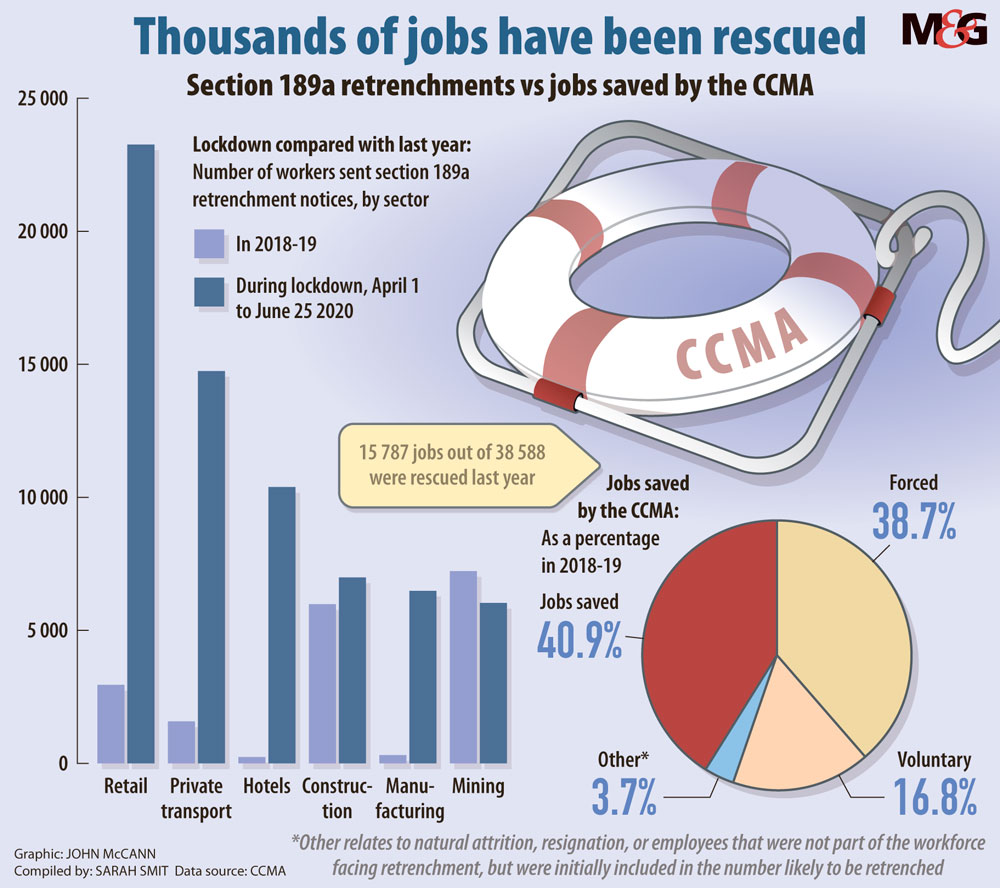Warning: Labour Minister Thulas Nexi told Parliament that the Unemployment Insurance Fund may have to get external funding if job losses surge. (Delwyn Verasamy/M&G)
More than 100 000 workers face retrenchment under the Covid-19 lockdown, almost three times as many as last year, according to figures provided by the Commission for Conciliation, Mediation and Arbitration (CCMA).
The jobs carnage is certain to intensify now that the Unemployment Insurance Fund’s (UIF) Temporary Employer/Employee Relief Scheme (Ters) has ended.
Yet the CCMA has just had its budget slashed by more than R55-million.
According to the data, 1 676 small-scale retrenchment cases, and a further 362 large-scale retrenchment cases were referred to the statutory body between April 1 and the end of June.
These cases could affect 105 383 workers, although not all of them will ultimately be retrenched.
The CCMA’s mandate is to facilitate retrenchment processes, averting and minimising job losses where possible. In the 2018-2019 financial year, its intervention prevented 41% of workers who had been given section 189a (large-scale) retrenchment notices from losing their jobs.

The commission’s 2018-2019 financial report stated that 38 588 workers were the subject of section 189a retrenchments during that year. In the three months between April 1 and the end of June this year, 101 514 workers received retrenchment notices — an increase of 163%.
Not all retrenchments make it to the CCMA.
The Covid-19 pandemic, which could cause the country’s gross domestic product to contract by 7.2% in 2020, is set to deepen South Africa’s long-standing unemployment crisis.
Minister of Employment and Labour Thulas Nxesi has warned that large-scale job losses are inevitable.
In May Nxesi told Parliament’s employment and labour committee to prepare for an onslaught of cases at the CCMA. He said the statutory body was already labouring under the increased workload after the implementation of the minimum wage.
At the time of the May 12 meeting, the CCMA had received case referrals for only 17 large-scale retrenchments. These were likely to be “the tip of the iceberg”, Nxesi said.
With the government’s efforts to stem the tide of job cuts through the UIF’s Covid-19 benefit now at an end, another wave of redundancies is sure to land at the doorstep of the commission.
Yet adjustments made in the supplementary budget, announced by Finance Minister Tito Mboweni last week, will see the CCMA operating with R55.4-million less in the coming year.
According to the supplementary budget, vacancies at the CCMA will only be filled later in the 2020-2021 financial year. Goods, services and travel will also be scaled back.
“The commission is preparing for an increased caseload due to salary disputes, and increased requests for assistance through the Ters programme by companies in distress due to the restrictions on economic activity,” according to the supplementary budget.
The CCMA’s director, Cameron Morajane, said this week that the commission “is concerned and is constantly in discussion with the department of employment and labour on the matter [of budget cuts]”.
“Financial sustainability of the CCMA has been a strategic concern over the years, especially because of the increasing case referrals received by the organisation year on year,” he said. “The coronavirus pandemic has increased the concern and the CCMA is embarking on a number of activities to address the concern.”
Morajane said the CCMA’s core business, “expeditious dispute resolution”, will ultimately be affected by the cut, but that it was reviewing its operational model to improve efficiency.
It was also pursuing initiatives to ensure that the attainment of social justice is not prejudiced, such as minimising non-core activities and projects and “pursuing strategic partnerships to enhance service delivery”.
The CCMA’s ability to fulfil its mandate has already been compromised by Covid-19 and the lockdown, which forced the commission to close its doors for just over a month. Since its re-opening in May, it has had to contend with a number of Covid-19 outbreaks at its offices.
According to CCMA data, 23 898 cases were referred to it between April 1 and the end of June.
Case referrals are increasing each month and, according to Morajane, the CCMA “is monitoring the situation closely”.
The CCMA is in the process of introducing web-based hearings to allow for socially distanced arbitrations. But Morajane told Parliament in May that it would need an estimated R56-million to upgrade its information and communications technology infrastructure.
Democratic Alliance MP and labour lawyer Michael Bagraim called the slashing of the CCMA’s budget “reckless”.
As a member of Parliament’s labour committee, Bagraim exercises an oversight role over the CCMA.
“If anything, the CCMA needs to double its budget … Treasury has told us that anything up to a further seven million people will be retrenched. Of the people who get retrenched, one can expect that 10 to 20% will challenge it [at the CCMA].”
Bagraim said the budget cut could tarnish the department of labour’s “only jewel”.
“And who are you punishing? For the employers it would be fantastic for the CCMA to become dysfunctional … So you can retrench all your staff and the chance of them getting their cases heard is negligible.”
Bagraim said workers and the trade unions that represent them “need a functional CCMA”.